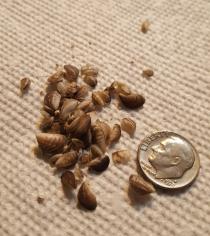“Puddles,” Washington State’s first mussel detection dog, proved on Memorial Day weekend that a canine partner is invaluable in the fight against aquatic invasive species.
While working the boat check station on the Washington-Idaho border just east of Spokane this past weekend, Puddles discovered invasive mussels on a boat traveling from Lake Havasu, in Arizona.
The boat had already been decontaminated at three previous Montana and Idaho decontamination sites before Puddles’ nose was able to detect what human eyes had missed; tiny invasive mussels hidden behind part of the boat’s sonar system.
Without a canine partner like Puddles, these mussels would not have been found and could have ended up costing millions of dollars in damage in a body of water that doesn’t already have invasive mussels, said Washington Department of Fish and Wildlife.
Invasive mussels, such as quagga and zebra mussels. have been spreading across North America since the 1980s. The Columbia River is the only basin in the U.S. that remains mussel-free. Mussels render beaches unusable, clog water filtration pipes, and destroy boat engines.
The U.S. Fish and Wildlife Service estimates that if zebra and quagga mussels invade the Columbia River, they could cost hydroelectric facilities up to $300 million a year, and cause hundreds of millions more in costs associated with environmental damage and increased operating expenses to fish hatcheries and water diversions.
Puddles is just one weapon in the fight against invasive mussels. She was initially surrendered to an animal shelter in Fresno, California where she caught the attention of the Green Dog Project’s “Rescued for a Reason” program. Staff at the Green Dog Project contacted Mussel Dogs, in Oakdale California, and Puddles was trained to detect mussels using her sensitive nose. WDFW received a grant from the Bureau of Reclamation to purchase Puddles for their Aquatic Invasive Species Check Station program.
The public can do its part to prevent the spread of invasive species by cleaning, drying, and draining watercraft, including kayaks and other non-motorized vessels, every time they are taken it out of the water. This includes drywells and gear that was in the boat as well. Also, stop at every boat check.
Meanwhile, in Montana, boat owners transporting watercraft with ballast tanks will undergo additional cleaning at watercraft inspection stations to prevent the spread of aquatic invasive species.
State law requires watercraft with ballast tanks or bladders to be decontaminated before launching on Montana waters. Decontamination is required when coming into Montana from out of state or when traveling west across the Continental Divide into the Columbia River Basin.
Boats with ballast tanks are typically used for wake boarding or wake surfing. The additional water weight allows the motorboat to create a large wave that wakeboarders can surf on.
Some aquatic invasive species are so small they can only be seen under a microscope. Standing water inside ballast tanks or bladders can unintentionally conceal these tiny invaders. Quagga and zebra mussel larvae can survive unseen in standing water for up to 30 days. Even when a boat owner drains the tanks or bladders some residual water remains inside.
Depending on the watercraft and the number of tanks, a decontamination can take up to one hour to allow for a hot-water flush of all tanks. Boater owners should budget time at the watercraft inspections station into their travel plans or arrange for an inspection and decontamination ahead of time.
To find a watercraft inspection station or to learn more, go to www.CleanDrainDryMT.com or call the FWP Aquatic Invasive Species Bureau at 406-444-2440.
Also see:
— CBB, March 26, 2020, STOPPING INVASIVE MUSSELS: WATERCRAFT INSPECTIONS RISE ACROSS FOUR STATES; QUAGGA/ZEBRA MUSSEL INTERCEPTIONS DROP SLIGHTLY https://www.www.www.columbiabasinbulletin.org/stopping-invasive-mussels-watercraft-inspections-rise-across-four-states-quagga-zebra-mussel-interceptions-drop-slightly/
— CBB, May 1, 2020, MONTANA FINDS MUSSELS ON SAILBOAT COMING FROM ARIZONA, HEADED FOR IDAHO https://www.www.www.columbiabasinbulletin.org/montana-finds-mussels-on-sailboat-coming-from-arizona-headed-for-idaho/

